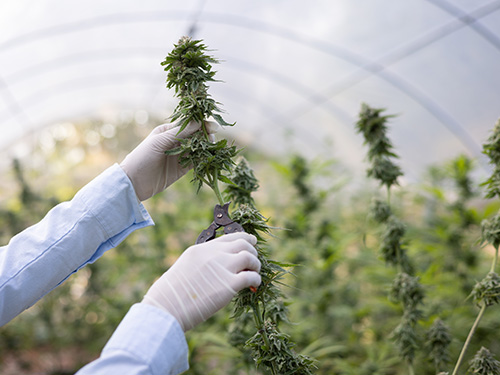What Does The New Hemp Bill Mean for Tennessee Farmers?
Aug 04, 2025

Starting in January, Tennessee’s hemp regulations will change statewide, largely revolving around what stores can sell.
Hemp became a more popular crop in the state with the declining number of tobacco farms since the late 1990s. It has been an option to grow since the Tennessee legislature gave the green light to farmers for the crop in 2019.
Since that time, Tennessee has 143 hemp farms, according to the U.S. Department of Agriculture Census in 2022. That is the latest available. Of those farming hemp, around 86,650 pounds were harvested in that census cycle.
Lawmakers said throughout the 2025 session that they felt that Tennessee had unregulated marijuana on its shelves, which prompted HB 1376 and SB 1413. This bill didn’t pass without a bipartisan fight, with some arguing it would affect growers adversely.
“We have a situation here in Tennessee where we are essentially dealing with unregulated recreational marijuana,” said Sen. Richard Briggs, R-Knoxville, who sponsored the bill. He made this statement during the debate on the bill. “It’s the wild west out there.”
What the law does is effectively ban THC-A products. It puts age limits on products and new guidelines around driving under the influence on hemp-cannabis products.
And what it means for this group of farmers remains the same.
“As to growers you ask about, TDA’s requirements for licensed hemp producers remain unchanged under the state hemp program, which complies with federal requirements,” said Kim Doddridge, public information officer for the Tennessee Department of Agriculture.
At the start of the year, the bill will transfer regulatory authority over hemp-derived products away from the Tennessee Department of Agriculture. It will now go to the Tennessee Alcoholic Beverage Commission.
The Tennessee Department of Agriculture said in a notice to growers that it will process applications to produce hemp and renew licenses throughout 2025.
“Therefore, TDA’s licensing requirements for HDC retailers and suppliers remain unchanged,” the department stated in a notice.
Those who applied for licensing after July 1 will have an expiration date of June 30, 2026.
Hemp became a more popular crop in the state with the declining number of tobacco farms since the late 1990s. It has been an option to grow since the Tennessee legislature gave the green light to farmers for the crop in 2019.
Since that time, Tennessee has 143 hemp farms, according to the U.S. Department of Agriculture Census in 2022. That is the latest available. Of those farming hemp, around 86,650 pounds were harvested in that census cycle.
Lawmakers said throughout the 2025 session that they felt that Tennessee had unregulated marijuana on its shelves, which prompted HB 1376 and SB 1413. This bill didn’t pass without a bipartisan fight, with some arguing it would affect growers adversely.
“We have a situation here in Tennessee where we are essentially dealing with unregulated recreational marijuana,” said Sen. Richard Briggs, R-Knoxville, who sponsored the bill. He made this statement during the debate on the bill. “It’s the wild west out there.”
What the law does is effectively ban THC-A products. It puts age limits on products and new guidelines around driving under the influence on hemp-cannabis products.
And what it means for this group of farmers remains the same.
“As to growers you ask about, TDA’s requirements for licensed hemp producers remain unchanged under the state hemp program, which complies with federal requirements,” said Kim Doddridge, public information officer for the Tennessee Department of Agriculture.
At the start of the year, the bill will transfer regulatory authority over hemp-derived products away from the Tennessee Department of Agriculture. It will now go to the Tennessee Alcoholic Beverage Commission.
The Tennessee Department of Agriculture said in a notice to growers that it will process applications to produce hemp and renew licenses throughout 2025.
“Therefore, TDA’s licensing requirements for HDC retailers and suppliers remain unchanged,” the department stated in a notice.
Those who applied for licensing after July 1 will have an expiration date of June 30, 2026.